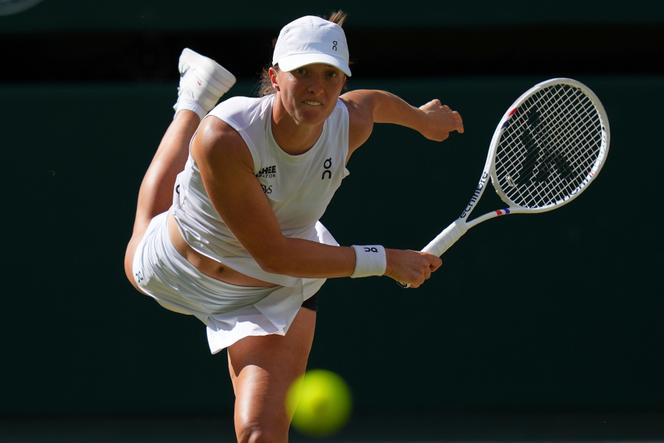Iga Swiatek knocks out Amanda Anisimova to win her first Wimbledon
"A final isn't something you play, it's something you win," said footballer Paul Pogba. A mantra that tennis player Iga Swiatek could easily adopt. The Polish player won her first Wimbledon tournament on Saturday, July 12, beating American Amanda Anisimova in less than an hour without losing a single game (6-0, 6-0). This is her sixth Grand Slam title in as many finals.
The clash of styles between the American puncher and the Polish blocker promised a close match, but it was anything but, much to the disappointment of the London crowd. The contest between these two players, who had never before faced each other in an official match, was cut short. Inhibited by the pressure of the event, immediately taken by the throat by her opponent, the world number twelve was completely non-existent in this final.
No player had won Wimbledon by such a score since Great Britain's Dorothea Douglass Chambers in 1911. Already, in the semifinals, the Warsaw native had been expeditious against Switzerland's Belinda Becic, dispatched in two straight sets (6-2, 6-0) and one hour and twelve minutes. At 24, Iga Swiatek won her first tournament since her fourth Roland-Garros title in 2024. "It seems completely unreal, " she said after the match. "Honestly, I didn't dream of this moment, it was far too unattainable!"
“You are an incredible player.”"You're an incredible player and it showed today. You're an inspiration to me," Anisimova said after the match, close to tears. "I had an incredible two weeks," she added, watched by Princess Kate Middleton, the wife of Crown Prince William, "even though I ran out of fuel today and would have liked to have performed better. I'm going to keep working and I hope to come back here one day." Despite the brutal defeat, Amanda Anisimova received a standing ovation from the London crowd.
In the previous round, she had narrowly beaten (6-4, 4-6, 6-4) Belarusian Aryna Sabalenka, Iga Swiatek's great rival, who ousted her from the throne of world number one in 2024. Finding herself in the final was already a victory in itself for the Floridian, struck by the sudden loss of her father and coach in 2019, and by the years of depression that followed, until her withdrawal from the tour to better regenerate in 2023.
From the start of the final, Iga Swiatek put Amanda Anisimova under pressure with the quality of her returns. Her tactic was clear: prevent the American from settling into the rally so she couldn't use her powerful backhand, her main weapon along with her return of serve. Constantly cornered and forced to take risks, the Freehold, New Jersey, native made a string of glaring errors, particularly on her serve.
Considered primarily a "clay player"—she won Roland-Garros in 2020, 2022, 2023, and 2024—Iga Swiatek wasn't among the favorites for the London tournament. Lacking a significant grass-court rival, Wimbledon organizers had ranked her eighth seed, even though she's ranked fourth in the world. Yet, it was she who lifted the Venus Rosewater Dish, the women's singles trophy at Wimbledon since 1886, on Saturday.
Iga Swiatek is the ninth different winner of the London tournament in nine editions. Since Serena Williams won for the seventh and final time at the All England Club in 2016, Wimbledon has been systematically won by players who have never before triumphed on the London grass.
Imperial in serviceAfter clearly dominating the women's tour in the first half of 2024, Iga Swiatek went through a difficult time at the beginning of 2025, losing to Aryna Sabalenka in the semifinals of both the Australian Open and Roland Garros. At the end of 2024, the Pole was suspended for a month following a positive test in 2024 for trimetazidine, a banned substance. It was a real ordeal for her. "There were a lot of tears and sleepless nights . It was the hardest experience of my life so far," she said.
The source of the contamination was ultimately recognized as accidental by anti-doping authorities. Iga Swiatek explained that she had taken an over-the-counter medication in Poland containing melatonin to combat insomnia related to jet lag.

On Saturday, the Polish player was superior to her opponent in all areas of the game, particularly in her court coverage. More unexpectedly, Iga Swiatek was also imperious on serve, an area of the game she has been working on since the beginning of the year with her coach, Belgian Wim Fissette. The adjustment period lasted several months, but she is reaping the rewards, now being able to regularly serve above 185 km/h. Since losing the set in the second round against the American Catherine McNally (5-7, 6-2, 6-1), she has not been worried about her serve.
The first Polish woman in the Open era (which began in 1968) to win Wimbledon, she is guaranteed a rise to third place in the WTA rankings on Monday. She also becomes the youngest player to win on all three surfaces of the Grand Slam tournaments since American Serena Williams, at the age of twenty, in 2002.
Jérôme Porier (special correspondent in Wimbledon, United Kingdom)
Contribute
Reuse this content




